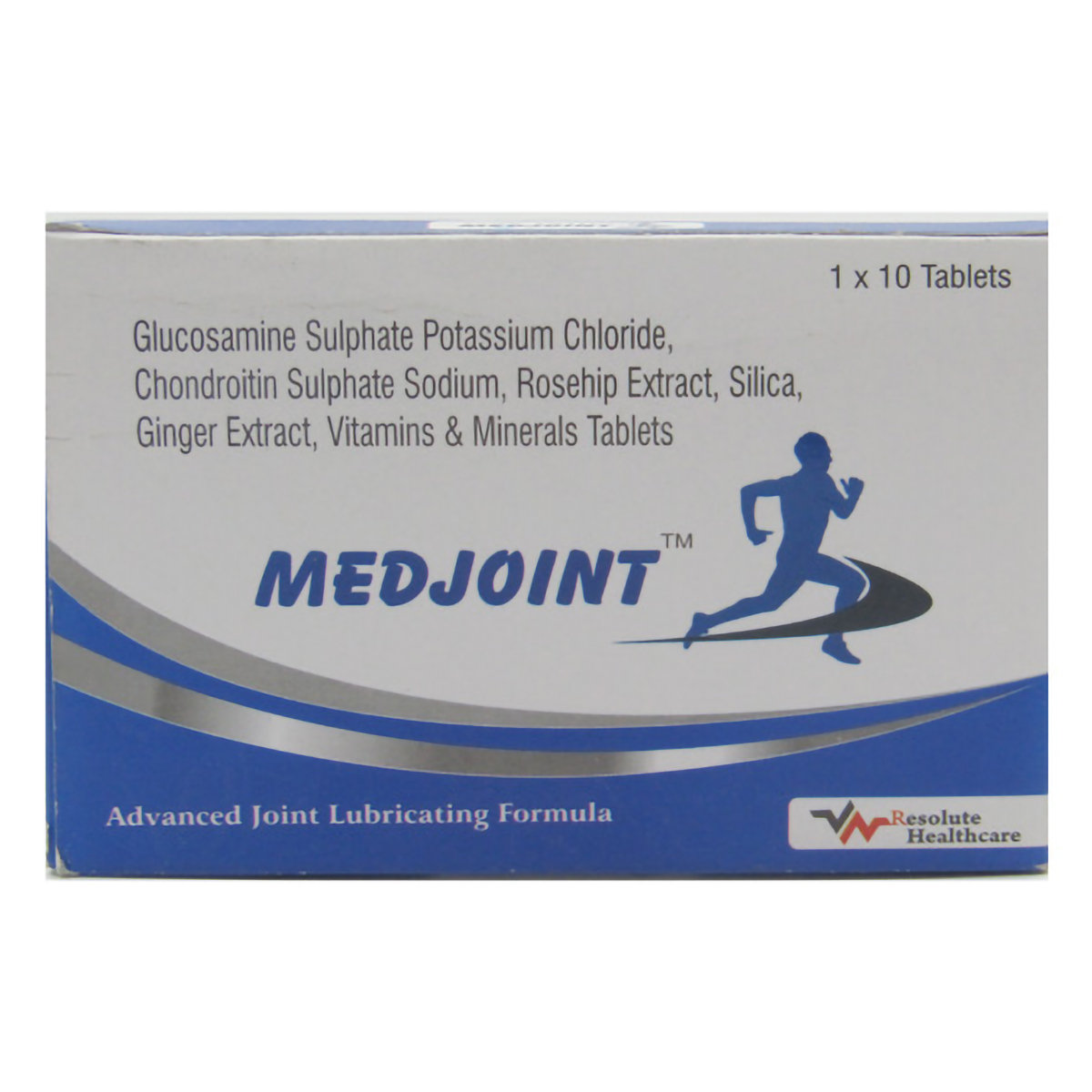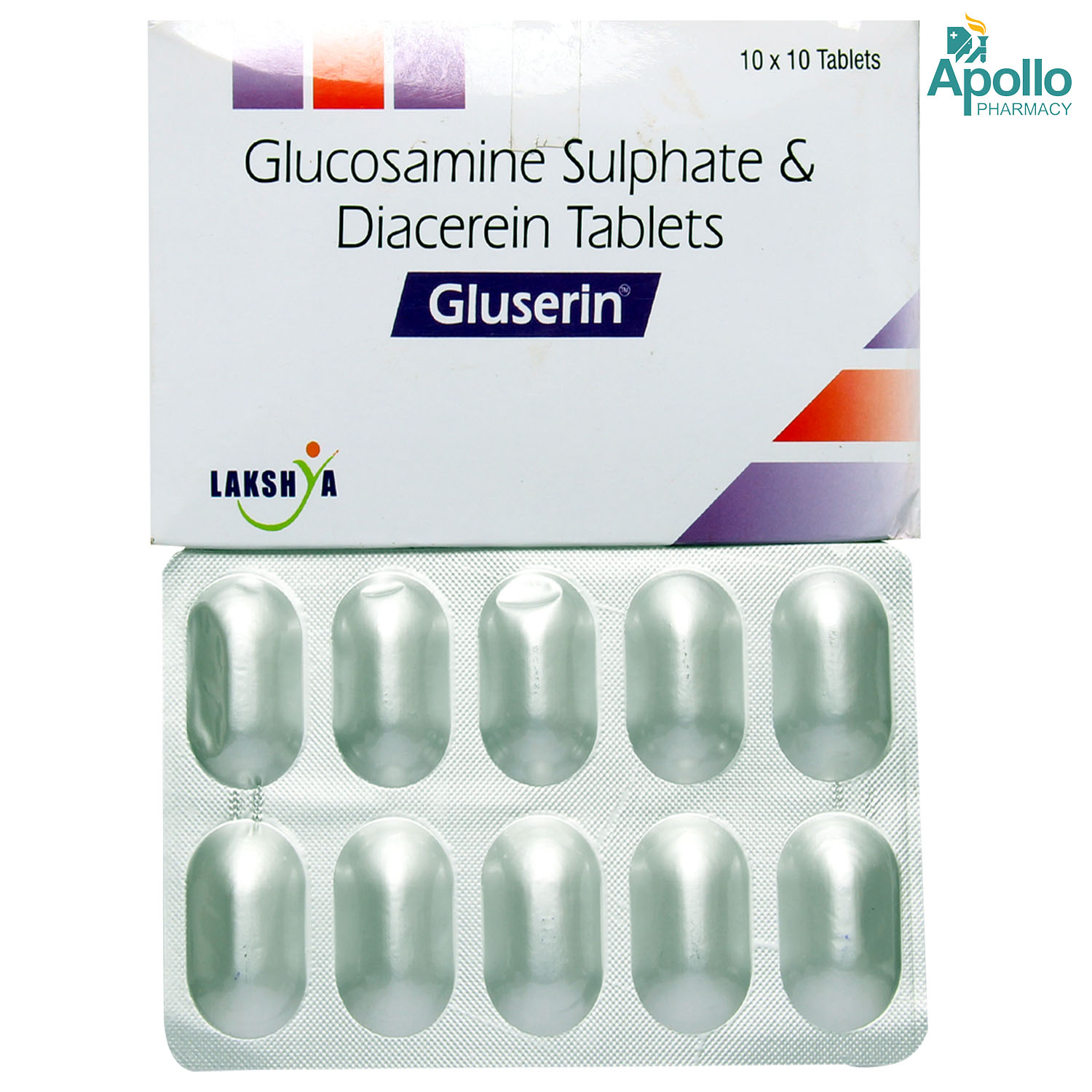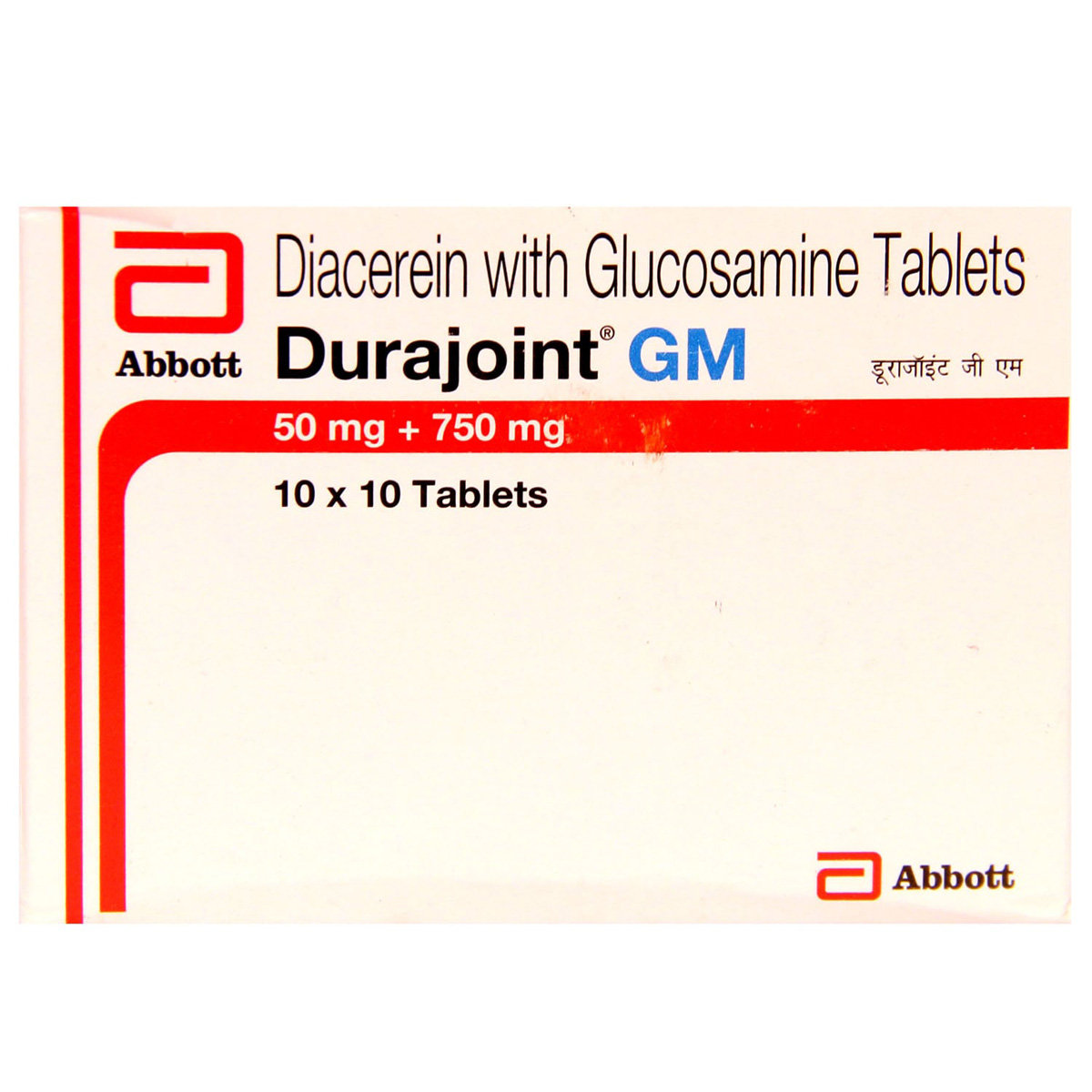Glucosamine+diacerein
About Glucosamine+diacerein
Glucosamine+diacerein belongs to a class of medications called 'non-steroidal anti-inflammatory (NSAID)/ anti-inflammatory and antirheumatic agents, non-steroids', primarily taken for reducing the pain of osteoarthritis (OA) in specific large and small joints. Osteoarthritis is a chronic (lifelong) joint condition in which Glucosamine sulfate (a chemical found in the human body, especially in joints) gets reduced. The body uses this fluid to produce other chemicals required to make ligaments, cartilage, tendons, and the thick fluid surrounding joints. When this chemical gets reduced, then the cartilage breaks down and becomes thin, which causes friction between the bones leading to wear and tear (damage) of the joint tissues leading to pain, stiffness, inflammation, and reduced locomotion.
The Glucosamine+diacerein compromises two medicines, namely Diacerein and Glucosamine. Diacerein restricts the action of a protein responsible for causing inflammation and destruction of cartilage or osteoarthritis. At the same time, Glucosamine sulfate is a natural protein found in the body used by the body to produce various chemicals responsible for building ligaments, cartilage, tendons, and the thick fluid surrounding joints. Taking Glucosamine+diacerein may either enhance the cartilage and fluid surrounding joints or prevent both components' breakdown. In combination, both help form cartilage (the soft tissue that cushions the joints) and make the joints lubricated for better movement and flexibility. Glucosamine+diacerein relieves pain, thereby improving joint function and helping individuals restore their quality of life. It also increases the cushioning and lubrication of joints that, provide relief in pain and easily do physical activity.
Take Glucosamine+diacerein as prescribed by your doctor. You are suggested to take Glucosamine+diacerein as long as your doctor has prescribed it after checking your medical condition. Sometimes, you may experience certain common side effects, such as headache, tiredness, nausea, abdominal pain, indigestion, diarrhoea, constipation, and wind. Most of these side effects do not require medical attention and resolve gradually over time. However, you are advised to talk to your doctor if you experience these undesirable effects persistently.
Glucosamine+diacerein is not allowed to be used in children younger than 18. Consult your doctor if you have ever had blood clots or circulation problems in your legs or if you are pregnant or planning to be pregnant, as this may harm an unborn baby. Tell your doctor if you are breastfeeding as It may not be safe to breastfeed a baby while taking Glucosamine+diacerein. People with joint infection or skin disease in the affected area should consult a doctor before taking Glucosamine+diacerein. People dealing with impaired glucose tolerance, kidney or liver dysfunction risk factors for heart (cardiovascular) disease, and who have asthma should take Glucosamine+diacerein with caution.
Uses of Glucosamine+diacerein
Medicinal Benefits
The Glucosamine+diacerein compromises two medicines, namely Diacerein and Glucosamine. Diacerein restricts the action of a protein responsible for causing inflammation and destruction of cartilage or osteoarthritis. At the same time, Glucosamine sulfate is a natural protein found in the body used by the body to produce a variety of chemicals responsible for building ligaments, cartilage, tendons, and the thick fluid surrounding joints. Taking Glucosamine+diacerein may either enhance the cartilage and fluid surrounding joints or prevent both components' breakdown. In combination, both help form cartilage (the soft tissue that cushions the joints) and make the joints lubricated for better movement and flexibility. Glucosamine+diacerein relieves pain, thereby improving joint function and helping individuals restore their quality of life. It also increases the cushioning and lubrication of joints, provides relief from pain and easily do physical activity.
Directions for Use
Storage
Side Effects of Glucosamine+diacerein
- Nausea
- Diarrhoea
- Headache
- Tiredness
- Indigestion
- Constipation
- Abdominal pain
- Wind (flatulence)
Drug Warnings
Consumption of alcohol should be avoided during the treatment with Glucosamine+diacerein as it may lead to an increased risk of liver damage. Patients with blood clots or leg circulation problems should not take Glucosamine+diacerein. Although it is generally a safe medicine to use, it should be avoided in patients with liver and kidney disease as the Glucosamine+diacerein may harm the liver and renal functions. Use with caution in pregnancy and breastfeeding. Do not self-administer Glucosamine+diacerein if you are pregnant or are nursing. Although Glucosamine+diacerein provides symptomatic relief in conditions like arthritis and may reduce the inflammation caused by these conditions, it is strongly recommended to remain physically active as much as your condition allows to achieve the best results. Adopting a healthy lifestyle and a diet containing high proteins is the mainstay for managing arthritic conditions.
Drug Interactions
Drug-Drug Interactions: Glucosamine+diacerein can interact with medicines used for blood thinning (Warfarin), Medications for cancer (Paclitaxel), painkillers (Acetaminophen), Antidiabetes drugs (glimepiride, pioglitazone). Inform your doctor if you are using any of these.
Drug-Food Interactions: Avoid intake of Vitamin E, St. John’s wort (antidepressant), and Ginkgo Biloba with Glucosamine+diacerein.
Drug-Disease Interactions: People dealing with impaired glucose tolerance, kidney or liver dysfunction risk factor for heart (cardiovascular) disease, and suffering from asthma should take Glucosamine+diacerein with caution.
Drug-Drug Interactions Checker List:
Safety Advice

Alcohol
unsafeYou are recommended not to consume alcohol along with Glucosamine+diacerein to avoid unpleasant side effects.

Pregnancy
unsafeGlucosamine+diacerein should not be injected in pregnancy as the safety and effectiveness of Glucosamine+diacerein has not been established. Please consult your doctor.

Breast Feeding
unsafeGlucosamine+diacerein should not be injected in breastfeeding mothers as the safety and effectiveness of Glucosamine+diacerein have not been established.

Driving
cautionIn some cases, Glucosamine+diacerein may cause dizziness and drowsiness. So if you observe such symptoms, then do not drive.

Liver
cautionGlucosamine+diacerein should be used with caution in persons dealing with any liver disorders. Your doctor will weigh the benefits and any potential risks before prescribing it to you. Please consult your doctor.

Kidney
cautionGlucosamine+diacerein should be used with caution in persons dealing with kidney disorders. Your doctor will weigh the benefits and potential risks before prescribing them. Please consult your doctor.

Children
unsafeGlucosamine+diacerein can not be given to persons younger than 18 years of age as the safety and effectiveness of Glucosamine+diacerein have not been established.
Habit Forming
Diet & Lifestyle Advise
- Include more glucosamine, chondroitin sulfate, vitamin D, and calcium-enriched supplements. Besides this, turmeric and fish oils can help reduce inflammation in the tissue.
- Please do not go for heavy exercise as it may increase your joint pain in arthritis. Instead, you can do stretching and low-impact aerobic exercises like walking on a treadmill, bike riding, and swimming. You can also strengthen your muscle strength by lifting light weights.
- Including fish like salmon, trout, tuna, and sardines in your daily diet. These fishes are enriched with omega-3 fatty acids with a minimum level of chemicals called cytokines, which ramp up inflammation.
- Your sitting posture is important, especially when you have pain and inflammation condition. Try to sit as little as possible and only for a short time (10-15 min). Use back support like a rolled-up towel to minimise pain at the back of your curve. Keep your knees and hips at a right angle. Besides this, you can use a footrest if required.
Special Advise
- X- rays of affected joints is done to identify osteoarthritis
Patients Concern
Disease/Condition Glossary
Pain: Pain is an unpleasant and emotional experience associated with tissue damage. It allows the body to react and prevent further tissue damage. Pain can be short-term (acute) or long-term (chronic). Pain perception can differ from person to person, from tolerable to non-tolerable.
Osteoarthritis: Osteoarthritis is a degenerative joint disease in which the two ends of the joints come together due to the breakdown of a protective covering called cartilage. Due to the absence of this protective covering, the joints rub against each other, leading to pain and stiffness. Symptoms of osteoarthritis include pain, stiffness, inflammation and tenderness. The main reason for osteoarthritis is age; the older you are, the more likely you could get osteoarthritis, thus known as degenerative disease, meaning that the joints wear out as a person ages. Other reasons include past injuries such as torn cartilage, and dislocated joints and ligaments.
FAQs
Glucosamine+diacerein is not suggested in patients having liver problems. Glucosamine+diacerein is also not administered to patients with known allergies to Glucosamine+diacerein.
The safety and effectiveness of Glucosamine+diacerein in joints other than the knee have not been established. So its use in parts other than the knee joint should be avoided.
Glucosamine sulfate is a natural protein found in the body used by the body to produce a variety of chemicals responsible for building ligaments, cartilage, tendons, and the thick fluid surrounding joints. Taking Glucosamine+diacerein may either enhance the cartilage and fluid surrounding joints or prevent both components' breakdown.
You are advised to tell your doctor if you have diabetes, high cholesterol or triglycerides (a type of fat in the blood), cancer, liver disease, asthma, or other breathing disorder if you are allergic to shellfish, or you have taken a blood thinner (warfarin, Coumadin, Jantoven).
Some research suggests that the presence of Glucosamine in Glucosamine+diacerein may affect antidiabetic drugs; it can also increase the sugar level in the blood in type 2 diabetes. This is why it is suggested to go for regular checkups of blood sugar with type 2 diabetes.
Glucosamine+diacerein may increase the risk of bleeding in people taking Warfarin, so it is advised to tell your doctor if you are taking Warfarin or any other medicine.
Some research suggests that glucosamine sulfate may enhance insulin levels in the body which can increase blood pressure. To be safer side, go for regular blood checks and closely monitor your blood pressure.
It has been noticed that Glucosamine+diacerein may cause allergic reactions in persons who are sensitive to shellfish. Glucosamine is produced synthetically from shells of shrimp, lobster, and crabs.
Some research suggests that Glucosamine+diacerein may increase pressure inside the eye and may worsen glaucoma. So if you have glaucoma then tell to your doctor.






